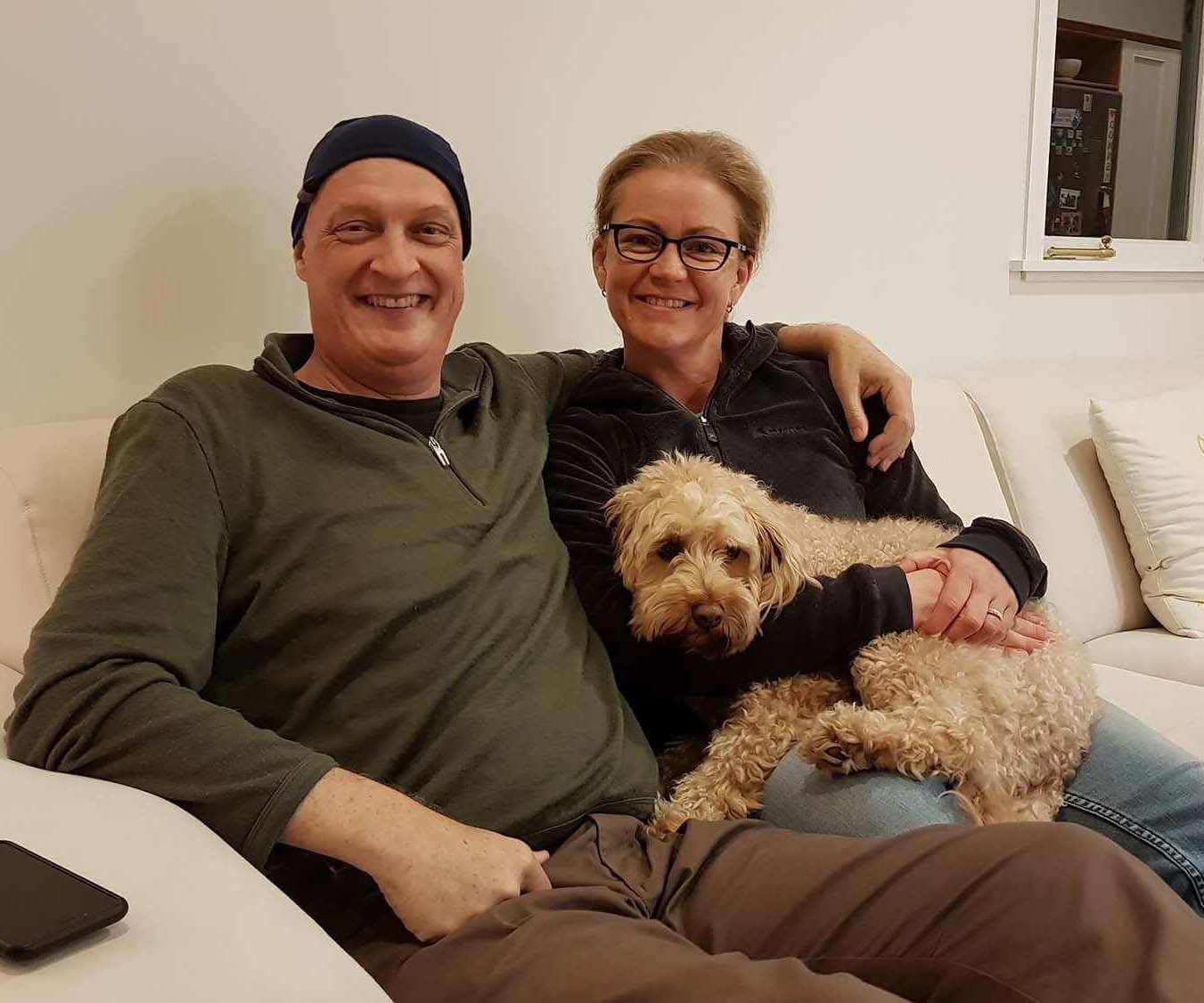When Karen Foster was diagnosed with breast cancer at 48, it was a “huge shock”, she says.
Karen had chemotherapy and has made a good recovery, but 10 years on is still suffering the after-effects, which impact her memory and concentration.
During chemotherapy, around 70 per cent of cancer survivors report difficulties including fuzzy thinking, trouble finding words and difficulty concentrating. For about 30 per cent, these issues continue after treatment is finished.
Collectively, these symptoms have been dubbed ‘chemo brain’, because of their supposed association with chemotherapy.
But more recently, research has shown that about 30 per cent of people with breast or bowel cancer have cognitive impairment before they start treatment.
This has led scientists to question whether the tumour itself may be responsible.
New research has supported this idea, and importantly, scientists have also discovered that early use of anti-inflammatory medications may be able to prevent memory problems.

Dr Adam Walker, a researcher at Neuroscience Research Australia, explains that chemo brain was first described by people with cancer.
Like so-called ‘baby brain’, some have wondered if it’s a real thing, but objective neuropsychological tests – which quantify the degree of cognitive impairment – show that around 30 to 40 per cent of patients have objective cognitive decline, he says.
Furthermore, “you have to bear in mind that the tests we’re using are designed to pick up some quite strong deficits,” he explains.
“They’re not really designed to pick up very mild cognitive impairment, which might mean that we’re missing a whole bunch of people who are telling us that they’re having problems, but we can’t actually measure it.”
What causes chemo brain?
The cause of chemo brain isn’t fully understood, but several mechanisms are being investigated.
These include the toxic effects from chemotherapy and/or the cancer on the brain, changing hormone levels, the role of neurotransmitters and genetic factors.
Two animal studies have looked at changes that might be occurring in the brain.
Neuroscientists from Stanford University, published research in the journal Cell in January, showing that the cancer drug methotrexate adversely affected three types of brain white matter cells in young mice.
A 2017 study at the University of Kansas found that hydrogen peroxide levels – which may cause damage that affects cognitive function – temporarily increased in the brains of chemotherapy-treated rats.
Other studies have looked at genetic markers that could indicate increased susceptibility to cognitive impairment after cancer treatment, including a gene that is associated with Alzheimer’s disease and another that influences how quickly the brain metabolises the neurotransmitter dopamine.
While these have all looked at what happens after treatment, Dr Walker’s research has explored what could be causing cognitive impairment in breast cancer patients prior to chemotherapy.
Using animal models, he found that cognitive problems could develop before there were any other cancer symptoms.
“It suggests to us that the tumour may have already hijacked the brain,” he says.
“So we need to re-evaluate what we think of as chemo brain and maybe call it ‘cancer-associated cognitive impairment’ or ‘cancer brain’, because it’s not just about the chemo.”

Karen says she didn’t realise that chemo brain was a thing until she heard other cancer survivors talking about it.
She likens the experience to a computer screen freezing up.
“It’s really frustrating because the screen in your head has frozen but the rest of your body is going ‘Come on, what are we doing here?'”
The actor and presenter says she used to be the go-to person for remembering people’s names at parties, but now “somebody can be introduced to me and nanoseconds later their name has gone”.
Karen says her biggest fear isn’t standing in front of a room of 500 people, but “losing my train of thought or not being able to recall what it is I’m trying to say.”
While not all cancer sufferers are affected by cognitive challenges, those who are experience it differently.
One lady she spoke to could no longer reverse her car into the garage, despite living in the same house with the same car for 12 years. “She just couldn’t get it right in her head,” explains Karen.
For most people, the cognitive impairment is mild, but it nonetheless interferes with everyday activities like work and raising a family.
For Karen, it was annoying and frustrating, affecting “simple things like going to the shop to get something, and you get there, and you’ve got no idea what it was”, she says.
“Sometimes, when I started to talk I knew exactly what I wanted to say, and I’d get halfway through the sentence and suddenly it just stops, and I’ve lost it completely.”

Professor Sanchia Aranda, AM, notes that many people with cancer also experience what’s known as cognitive fatigue.
“They feel as if their brains have not got the same stamina that they had before,” she explains.
She says that apart from neurotoxicity (toxic substances affecting the brain), “it may also be that you’re under stress, you’ve got a lot more things going on in your life, you’re more distracted perhaps from normal cognitive processing.
“Sorting out what all the elements are that contribute to the phenomenon will help with the development of interventions,” she says.
Professor Aranda adds that in some cases, ongoing cognitive problems can limit cancer survivors from returning to their previous roles, so understanding chemo brain is important for helping them recover.
“People often change roles and go for things that require less executive function or go to part-time work or retire early,” she says.
“Somebody might be able to cope with chemo brain if it’s short term and ends with chemotherapy, but if it continues – and it certainly is described by many women as continuing – is there a long-term impact on the brain and how do we prevent that from occurring?”
Dr Walker reiterates that cognitive impairment is one of the key factors that inhibits people’s ability to get back to work or perform as well as they used to, which has a hidden cost that’s estimated to be around $300,000 to $500,000 per individual over their lifetime.
This makes managing chemo brain effectively not just important for people’s quality of life, but to reduce the burden on the economy.

Dr Walker notes that while chemotherapy can cause cognitive problems, knowing that the tumour itself can be responsible has opened a new avenue for research.
His team discovered that tumour cells release chemicals that cause brain inflammation, leading to the cognitive impairment. They wondered whether anti-inflammatory drugs might therefore be helpful, and discovered that aspirin prevented memory loss from occurring.
The next step is testing whether it can reverse already established cognitive impairment.
These findings are “really promising, given that aspirin is very cheap and relatively safe for a lot of people”.
People with cancer shouldn’t “start gobbling up aspirin for this purpose yet,” he cautions.
“We need to do the clinical trials first.”
Funding permitting, trials should be able to start in the next two to three years, he says. If they are successful, the treatment could be available in five or six years.
Karen wishes these findings had been around when she was diagnosed, but says it’s “wonderful to know that people care enough to work out that chemo brain is absolutely real… and that somebody’s doing something about it to try and help”.
Managing chemo brain

Research into effective ways to manage chemo brain is still ongoing.
Some areas that are promising include cognitive behavioural training, exercise-based interventions and brain training programs.
A 2016 study at the University of Sydney, for example, found that participants who used an online neurocognitive training program had less cognitive symptoms than those who received standard care, but showed no difference on objective neuropsychological testing.
Meanwhile, there are strategies you can use to help you cope with the effects of chemo brain. These include:
Planning to do activities that require more concentration for when you are most alert
Discussing the issue with your family or workplace and seeking their support or assistance
Doing one thing at a time instead of multitasking
Setting aside time each day to read and respond to emails
Letting phone calls go to your answering machine or voicemail. You can listen to them when you’re ready
Carrying a small notepad or use a voice memo app to record things you want to remember
Before seeing the doctor, write down the things you want to ask
Keeping things you need each day, like phone and keys, in one place so they are easy to find
Using tech to help you, such as computer/mobile apps and reminders
Doing things that encourage memory such as crosswords and Sudoku
Writing lists of things you need to do
Ensuring you get enough rest and sleep
Taking time out to relax and do things you enjoy
Getting some exercise each day.
 Getty Images
Getty Images



